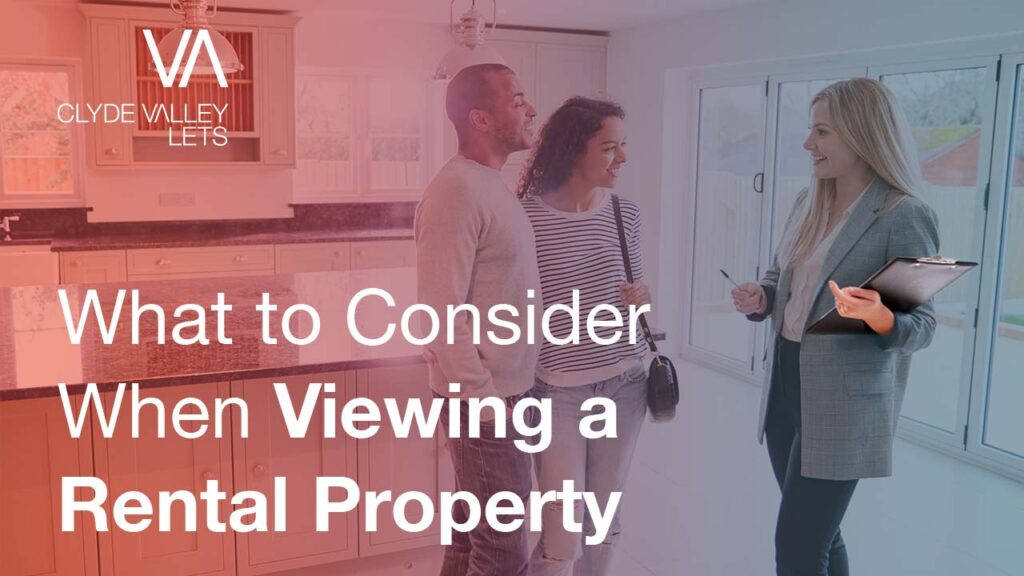It’s both exciting and a little bit intimidating when you visit a new property you’re considering renting. Your mind is filled with questions and you’re buzzing with anticipation.
But it’s important to approach the viewing with a practical mindset. So, to help you achieve that, here are our 10 things to consider when you’re viewing a property.

1. Are bills included in the rent?
It’s important to know whether any other bills or charges are included in the rent or if you will have to pay these separately. If you are required to pay other bills such as council tax, gas, and electricity it’s worth asking for an idea of how much these might cost so you can determine whether this fits with your budget.
Don’t leave this to chance and don’t assume that some bills, such as council tax, will automatically be included in your rent. If you’re not sure, ask!
If you are going to be sharing the property with another person(s) you should also consider who pays the bills or how they will be split between you each month.
2. When is the rent due, and how should it be paid?
Rent due dates can vary, and although you may expect to pay rent at the start of a month, this is not always the case, so you’ll need to plan your finances around this. Check with the agent which date the rent is due and if this does not suit, please let us know and we would be happy to work with you to find a more suitable date.
It’s important you discuss this as early as possible as it’ll save you any hassle of being chased for rent that hasn’t been paid on time, and it makes sure you’re always up-to-date with this very important bill.
If you are going to be sharing the property with another person(s) you will need to consider who pays the rent and how it will be paid each month.
3. How much is the deposit?
While you may think finding the money for the first month’s rent is all you need to do, you must factor into your budget the deposit that will be required before your tenancy begins.
You will be asked to pay a deposit equivalent to one month’s rent and this will likely be paid at the same time as your first month’s rent a day or two before you get your keys.
Your deposit will be paid into a recognised tenancy deposit scheme where it will be held for the duration of your tenancy. Your agent can give you more information on why we take a deposit and where it will be held.

4. How much is the council tax?
If you will be responsible for paying the council tax, it’s essential to know how much it will cost. Properties fall under different council tax bands, and each local authority will charge a different monthly cost for each band.
If the agent showing you around the property is not sure how much the council tax will cost, you can find out online at www.gov.uk/council-tax.
Equally, if you’re single and you don’t live with anyone else, you may be entitled to a single-person discount on your council tax.
So, when you’re looking at properties to rent, check out what the council tax will be for that area and whether you’ll get a discount, should you qualify.
5. How long is the contract/rental term?
All tenancy agreements are open-ended meaning there is no end (or renewal) date.
Once the tenancy has been signed it simply runs on a 30-day rolling contract. Should you change your mind about the property, for whatever reason, and wish to end the tenancy you would be required to give one month’s notice before the tenancy can end. You will have to pay rent up to and including the last day of your tenancy.
6. Who does the repairs and what if I have an emergency?
It is important to know to who you would report any repairs or faults. Would it be the agent or the landlord and what if the office is closed?
The agent will explain the process for reporting repairs but in most cases, repairs are reported to the agent who will arrange for the contractor to visit you to complete any works. There should also be access to an out-of-hours service should you have an emergency in the evening or at the weekend.
7. What is the local area like?
You may have found the perfect property, but if you are unfamiliar with the area you may want to find out more about the local amenities before making a final decision about applying for the tenancy. Ask the agent about the local area, transport links, and shops, etc. It is also wise to carry out your own research to find out if other things that are important to you such as schools, gyms or parks are also nearby or within easy reach.
8. What are the neighbours like?
They say everybody needs good neighbours, and it’s certainly an important consideration when looking for a rental property. The agent showing you around will likely inform you of who lives immediately next to, above, or below the property and try to answer any questions you have about others living in the block or street but you should also think about your household and whether your lifestyle will impact those around you.

9. What’s the policy on pets and redecoration?
All landlords will have their own views on pets and redecoration, some being more lenient than others so make sure to ask the agent so you are clear about the landlord’s stance as this could prevent a dispute at a later date.
Landlords may be open to accepting tenants with pets or allowing them to decorate but permission must always be sought before any works are carried out or before any pet is brought into the property. Redecorating without your landlord’s permission is likely to result in you losing part or all of your deposit as the landlord will have to put the property back to its original condition before it can be re-let.
10. Is there anything else I need to know?
When viewing a property, it’s important to take a good look around as this is somewhere you could be living for months or even years. You may also have other questions that will help you decide if the property is suitable for you – please ask no matter how obvious or irrelevant they may seem.
